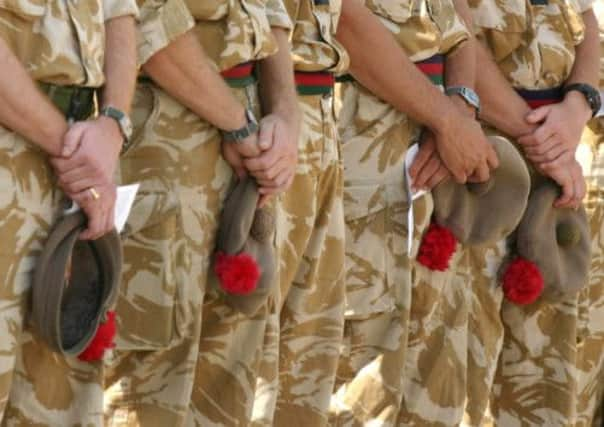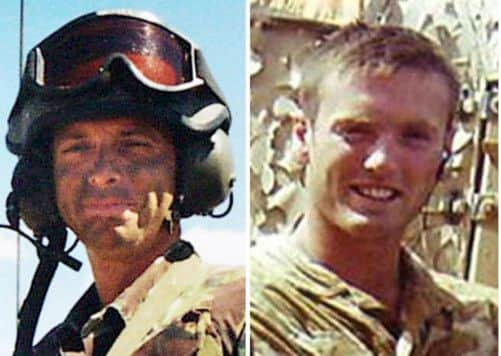‘Families of soldiers killed in Iraq can sue’


• Families of soldiers killed in Iraq to seek damages from UK government after Supreme Court rules claims can be made under human rights legislation
• Claims of negligence against Ministry of Defence who are accused of not providing adequate equipment and training to soldiers
Advertisement
Hide AdAdvertisement
Hide Ad• “The MoD argument that if they accept a duty of care it would inhibit decisions on the battlefield defies logic,” says lawyer representing families


The Supreme Court – the UK’s highest court – ruled that damages claims could be launched under legislation covering negligence and human rights.
Lawyers representing relatives said the ruling meant that the Ministry of Defence (MoD) owed a duty of care to properly equip servicemen and women who went to war.
Human rights campaigners said the ruling brought to an end a situation where personnel were expected to “fully respect the rights of civilians abroad while not being properly protected themselves”.
However, Defence Secretary Philip Hammond said he was concerned about the implications of the case, warning it could “make it more difficult” for troops to carry out operations.
The judgment followed legal action brought by several families, including those of three men – Private Lee Ellis, Private Phillip Hewett and Lance Corporal Kirk Redpath – killed by improvised explosive devices (IEDs) while travelling in Snatch Land Rovers and relatives of another serviceman – Corporal Stephen Allbutt – killed while on board a Challenger tank.
Until now, soldiers have not been covered by Article 2 of the European Convention on Human Rights – which protects the right to life – once they step off a British base in a war-zone abroad.
The government had argued that the soldiers were outside British jurisdiction – and so not subject to the legislation – and that their deaths were covered by the principle of combat immunity, which excludes battlefield operations from legal liability for negligence.
Advertisement
Hide AdAdvertisement
Hide AdLord Hope, one of the justices, said: “The extra-territorial obligation of the contracting state is to ensure the observance of the rights and freedoms that are relevant to the individual who is under its agents’ authority and control, and it does not need to be more than that.”
He made clear that in deciding whether or not the state had breached its duties, the courts should not impose an “impossible” or “disproportionate” burden on the authorities.
Equally, Lord Hope added, “the widest measure of appreciation” must be given to commanders for decisions taken on the ground and actively involved in armed conflict.
Scottish lawyer Jocelyn Cockburn of Hodge Jones & Allen, who represented the families, said the ruling had established “what seems common sense for most families”. She said: “It is essential we recognise the human rights and dignity of our own soldiers.
“Apart from the fact that they are entitled as human beings to rights that we recognise as universal, how else can we expect them to uphold the human rights of those they come across in conflict if they themselves are not protected?”
Welcoming the judgment, Pte Hewett’s mother, Sue Smith, 51, of Tamworth, Staffordshire, said: “They can no longer treat soldiers as sub-human with no rights. It’s been a long fight but it’s absolutely brilliant. Now serving soldiers have got human rights. What we have done here will make a difference to a lot of people.”
However, Mr Hammond said the ruling may well have far reaching consequences for military action abroad, and cautioned against jeopardising national security in favour of protecting human rights.
Emphasising that the government’s “most important priority” was protecting its troops, he pointed out that since the litigation started, a range of protected vehicles – such as the Mastiff, Ridgeback, Husky, Wolfhound, Jackal and Foxhound – have been available to commanders.
Advertisement
Hide AdAdvertisement
Hide AdHe said: “I am very concerned at the wider implications of this judgment, which could ultimately make it more difficult for our troops to carry out operations and potentially throws open a wide range of military decisions to the uncertainty of litigation.
“We will continue to make this point in future legal proceedings as it can’t be right that troops on operations have to put the European Convention on Human Rights ahead of what is operationally vital to protect our national security.”
Wendy Hewitt, deputy director of the Equality and Human Rights Commission, said: “This is not about interfering with the way military decisions are made in the field but how everyone in the armed forces is given the protections they deserve.”
The issues before the Supreme Court were originally considered at the High Court and then by the Court of Appeal.
In June 2011, a High Court judge in London said relatives could bring negligence claims but not claims under human rights legislation. In October 2012, appeal judges came to the same conclusion.
The Supreme Court justices analysed three central legal issues:
• Whether British soldiers killed during military operations abroad were within the jurisdiction of the UK for the purposes of Article 1 - which protects the right to life - of the European Convention on Human Rights (ECHR).
• Whether the MoD owed a duty to the deceased soldiers pursuant to Article 2 - which imposes a duty on authorities to protect the right to life by law - of the ECHR.
Advertisement
Hide AdAdvertisement
Hide Ad• Whether complaints of negligence are covered by the doctrine of combat immunity and whether it would be fair to impose a duty of care on the MoD.
‘It shouldn’t get to a position where we have to sue for justice – soldiers have a right to life’
THE widow of a British corporal killed by the Black Watch in a “friendly fire” incident in Iraq said she was “overjoyed” in light of yesterday’s Supreme Court judgment.
Debi Allbutt, the widow of Corporal Stephen Allbutt, is planning to launch a civil claim of negligence against the Ministry of Defence (MoD), after the highest court in the land ruled that it owed a duty of care to its service personnel.
Mrs Allbutt also called on the UK government to scrap the combat immunity covenant, which prevents soldiers from claiming compensation for injuries they received in combat except under official compensation schemes, arguing that it is “no longer worth the paper it’s printed on”.
Cpl Allbutt, 35, of Sneyd Green, Stoke-on-Trent, Staffordshire, was killed in Iraq in March 2003. He died after a Challenger 2 tank was hit by another Challenger 2 tank. Trooper David Clarke, 19, of Littleworth, Staffordshire, also died during the incident, which left Corporal Dan Twiddy, of Stamford, Lincolnshire, and Trooper Andy Julien, of Bolton, Greater Manchester, badly hurt.
Cpl Allbutt, was serving with the Queen’s Royal Lancers when another Challenger 2 tank, under the command of a senior Scottish officer in the Black Watch, unwittingly opened fire.
Mrs Allbutt was one of several claimants who have waged a long battle, and she said that the judgment caused her to “jump up and down with joy”. She said: “We’ve spent a decade fighting and now the avenues of the British legal system have been exhausted, so to come out and win, it was just like ‘wow’.
Advertisement
Hide AdAdvertisement
Hide Ad“How it stands now is that the armed forces can sue the government, but it shouldn’t get to that position where we have to sue them for justice. We’ve proven they owe a duty of care, and they can no longer hide behind the idea of combat immunity – the soldiers have a right to life under human rights law.
“So instead of the armed forces being able to sue, the government needs to look at its health and safety law and take out the exclusion based on combat immunity because it’s no longer worth the paper it’s printed on – it’s as simple as that. That is why I would still like to meet with the Prime Minister and discuss that. For one thing, it would cost them a lot less money.”
Mrs Allbutt added she had visited her husband’s grave in the hours before the ruling, which she described as a “vindication”. She said: “This morning I went and saw Stephen before we knew the ruling and said to him ‘This is it’. It’s been a hard battle and we were in court last year, and the year before, but have been challenged all the way by the MoD -– it’s taken a long time to get here. It’s been worth it.”
SEE ALSO